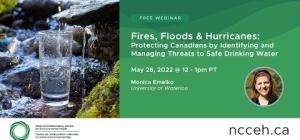
Guest Blog: Training and Support for Managing Drinking Water Systems in First Nations Communities in Ontario

As of September 2019, there were 56 long-term drinking water advisories (LTDWA) for public systems on First Nations reserves across Canada. These are either Boil Water advisories or Do Not Consume advisories that have been in effect for more than a year. Of these 56 LTDWA, more than half have been in effect for over a decade and while this is a cross-Canada issue, there is a greater number in Ontario (42) than all other provinces combined.
The Government of Canada has stated a goal of removing all 56 LTDWA by March 2021 but the reasons for the advisories are complex, and can relate to source water issues, system design or failing infrastructure as well as maintenance and operational issues. Building local capacity is one important measure towards ensuring long-term safe drinking water supply in affected communities.
This month, we have invited the Walkerton Clean Water Centre (WCWC) to blog on the training and support being offered to First Nations Communities in Ontario, as an illustration of one approach to capacity building efforts for improving drinking water quality through training and technical support.
Training for Operators of drinking water systems in First Nations communities
In partnership with Keewaytinook Okimakanak of the Northern Chiefs Council and the Ontario First Nations Technical Services Corporation, WCWC has designed training tailored to meet the needs of operators of First Nations drinking water systems. All training is delivered by instructors who have experience in training operators in First Nations communities. Participants can access one of two courses at no cost (including associated travel expenses). These include:
- An entry-level Course for Drinking Water Operators for First Nations: Each course delivery is a two-week initiative with one week of supervised self-study and one week of practical hands-on training.
- Managing Drinking Water Systems in First Nations Communities: A one-day course focused on components of effective drinking water system management, resources and practical tools. It is geared toward individuals in, or working towards, management and supervisory positions.
Pilot testing for communities
Water treatment systems in small and remote communities commonly face challenges such as effective natural organic matter removal, disinfection by-products control, iron and manganese treatment, and coagulation optimization. WCWC has been working on these issues for a number of years, and has carried out pilot testing on technologies that can help to address these challenges. WCWC offers a pilot testing program across Ontario that can be accessed by First Nations Communities to address challenges associated with source water characteristics, treatment process performance, and to test alternative treatment technologies. Pilot projects can be undertaken at the clients’ location or at the Technology Demonstration Facility (TDF) in Walkerton. The TDF features a laboratory and a range of drinking water treatment and distribution technologies, which can be used to assess the effectiveness of various treatments on challenging source water.
Additional support in our Drinking Water Resource Library
Although in person training, and pilot testing can provide valuable learning experiences, sometimes a trusted source of references is also needed to support communities. WCWC has developed an online reference library containing thousands of vetted resources addressing common issues facing drinking water systems, including a curated collection of First Nations resources. The Drinking Water Resource Library features multiple search functions to ease the research of information. This free resource can be accessed here.
Participation in our training program
Since 2017, more than 100 Indigenous participants have successfully completed the Entry-Level Course for Drinking Water Operators for First Nations. The feedback WCWC has received has been overwhelmingly positive. All participants of the initial offering of the Managing Drinking Water Systems in First Nations Communities course rated it as good or excellent. The pilot testing program has also been popular. WCWC has completed a number of pilot projects for First Nations communities in Ontario and three others are currently underway.
More information
For more information on any of WCWC’s initiatives to support drinking water improvements in First Nations communities, please visit www.wcwc.ca/en/training/first-nations-zone/ or contact us at 866-515-0550 or [email protected].
About the Author: Katherine Campbell is the Communications and Government Planning Coordinator with WCWC. WCWC is an agency of the Government of Ontario established in 2004 to coordinate and provide education, training and information to drinking water system owners, operators and operating authorities, and the public, to help safeguard drinking water. To date, high-quality drinking water training has been provided to more than 87,000 participants. For more information please visit www.wcwc.ca.








